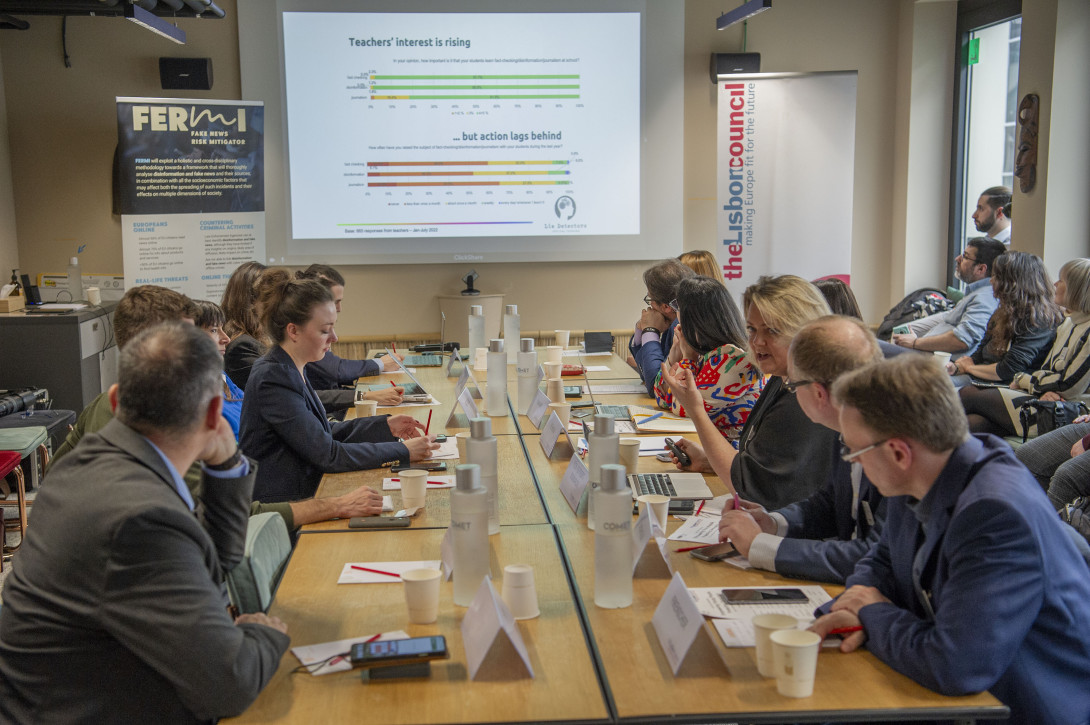
On 20 March 2024, the FERMI consortium policy partner “The Lisbon Council” organised the expert panel on "Empowering Young People, Protecting Democracy: How to Address Disinformation at School" in Brussels. The panel brought together distinguished experts from across the European Union to discuss the role of education in strengthening young people’s resilience to disinformation.
The panel speakers included Christina Yiannapi, member of the Advisory Council on Youth of the Council of Europe and secretary general of the Cyprus Youth Council, Juliane von Reppert-Bismarck, executive director and founder of LieDetectors, an award-winning media literacy organisation, and Gianmarco Guazzo, senior expert and community manager at the “At School of OpenCohesion” project, supported by the Department for Cohesion Policy of the Italian government. Simona Petkova, policy Officer at the Directorate-General for Education, Youth, Sport and Culture (DG EAC) of the European Commission, working on the “Digital Education Action Plan 2021-2027”, gave the closing remarks, offering insights into the policy aspects related to the topic.
ADDRESSING DISINFORMATION WITH EDUCATION
The expert panel offered valuable insights from various EU member states on the importance of a holistic educational approach against disinformation, bridging the different experiences on the subject each speaker brought to the table.
The pressing need to empower young people to be active citizens and not passive bystanders by fostering a culture of media literacy, critical thinking and responsible citizenship was emphasised by Christina Yiannapi during her remarks. This is especially important as many of them are getting ready to vote for the first time during European Parliament elections in June 2024.
Juliane von Reppert-Bismarck shared her expertise in developing and delivering media literacy trainings for teachers and educators. She stressed that, while teachers have a pivotal role, society and communities are responsible for supporting them by fostering cooperation, standardising approaches, and ensuring access to independent training.
The fundamental impact of strong communities was further highlighted during the presentation of good practices used by the “At School of OpenCohesion (ASOC)” project by Gianmarco Guazzo. Fostering the participation of students and teachers in civic monitoring research has proven to be an effective way of building a community of active and aware citizens and fostering critical thinking skills. These skills are crucial in the fight against disinformation.
THE FERMI APPROACH
The presentations by the three speakers was followed by a lively discussion during which participants asked thoughtful questions and gave insightful remarks. The conversation brought to the forefront a series of themes that preoccupy all those involved in the battle against disinformation, including the need for a holistic approach in building societal resilience against the spread of false information online, starting with education. The FERMI project, in its efforts to provide law enforcement agencies and communities with the technological tools to address challenges fuelled by disinformation, shares those concerns. Through its Community Resilience and Risk Management model, the FERMI project’s approach brings communities in the mix as it aims to understand societal resilience to disinformation.
As mentioned by Juliane von Reppert-Bismarck, impact assessments are important to measure the effectiveness of anti-disinformation and media literacy initiatives. The FERMI project subscribes to this idea by enabling data gathering on disinformation and their connection to real-life crime, which can be proven over time a useful resource for assessment of policies.
Thus, the FERMI project can assist in the detection of recurring incidents, which can trigger the spread of online disinformation and lead to real-life crime. One of these incidents are elections, which in the past have led to a rise in online disinformation that led to offline harm. In the past, election-related content has been the breeding ground for the spread of false information to the degree that led to crimes offline. For that reason, fostering societal resilience against disinformation is a core element of the FERMI project.